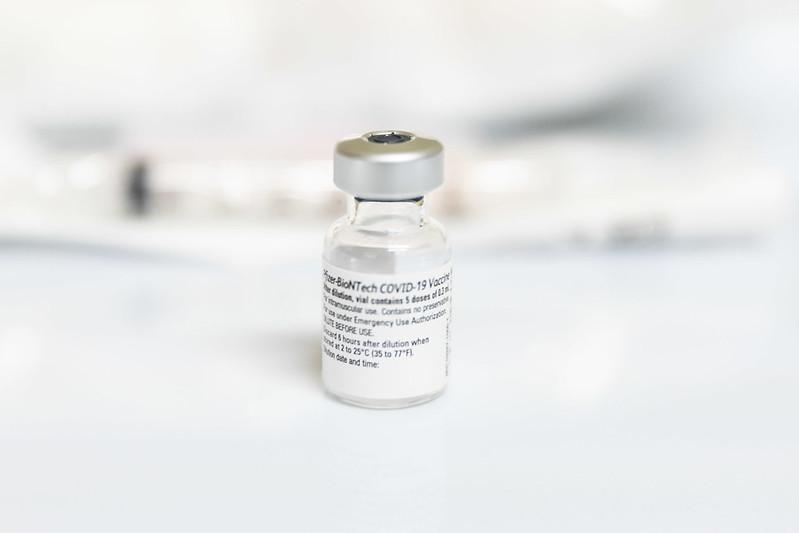With the country facing one of its deadliest months since the beginning of pandemic, US leaders began receiving doses of the first COVID-19 vaccine, while the nationwide rollout of the vaccine hit a few unexpected snags.
This morning in Washington, DC, Vice President Mike Pence, Second Lady Karen Pence, and US Surgeon General Jerome Adams received their first shot of the Pfizer-BioNTech vaccine on live television.
"Karen and I were more than happy to step forward, before this week was out, to take this safe and effective coronavirus vaccine that we have secured and produced for the American people," Pence told reporters after receiving the shot.
House Speaker Nancy Pelosi (D-Calif.) and Senate Majority Leader Mitch McConnell (R-Ky.) were also vaccinated today on Capitol Hill. Congressional physician Brian Monahan, MD, sent a letter to lawmakers yesterday saying he had been informed by the National Security Council that initial doses of the vaccine would be available to all members of Congress, the executive branch, and the Supreme Court, according to the Wall Street Journal.
President-elect Joe Biden and incoming First Lady Jill Biden will receive the vaccine on Monday, his transition team told reporters.
Some states getting fewer doses than expected
According to the Bloomberg News vaccine tracker, 24 states have reported administering 49,567 doses of the Pfizer-BioNTech vaccine, which started arriving at US hospitals and nursing homes earlier in the week. Healthcare workers and nursing home residents and staff are first in line to receive the initial doses of the two-dose vaccine.
While the arrival of the vaccine has been widely celebrated, and footage of healthcare workers receiving their first shot broadcast across the nation, some issues with vaccine distribution have begun to crop up. On Wednesday, the Washington Post reported, officials in several states noticed that the second shipments of vaccine they are set to receive next week were drastically lower than they were expecting. At least six states were told they would be getting fewer doses.
Among those states is Illinois. Gov. JB Pritzker told reporters Tuesday that the state's projected shipments of the Pfizer-BioNTech vaccine for December have been cut in half.
In a statement, Pfizer said that it is not having any production issues with the vaccine, and that no shipments are on hold or delayed. "We have millions more doses sitting in our warehouse but, as of now, we have not received any shipment instructions for additional doses," the company said.
A report from McClatchy DC suggests the confusion over how many doses states should be receiving could be linked to the online tracking system that the Pentagon is using to help states keep of vaccine shipment. The system, known as Tiberius, has been using projected allocations to help states with planning, but those allocations weren't updated with the accurate numbers when the Pfizer-BioNTech vaccine was granted an emergency use authorization (EUA) last week.
More vaccines appear to be coming soon. The Food and Drug Administration is expected to issue an EUA for Moderna's COVID-19 vaccine following a recommendation yesterday from the agency's panel of vaccine advisors. Once the EUA has been granted, 5.9 million doses of the vaccine will begin shipping out.
And yesterday, Johnson & Johnson announced that the phase 3 clinical trial for the single-dose COVID-19 vaccine developed by Janssen is now fully enrolled, with approximately 45,000 participants. Interim efficacy and safety data from that trial is expected by the end of January.
December surge continues
Despite the hopes raised by the arrival of COVID-19 vaccines, more than half of the country is worried about what the next few months may bring. The Kaiser Family Foundation's latest Health Tracking Poll shows 51% of Americans think the worst is yet to come in the pandemic, while 68% say they are worried that they or someone in their family will get sick from the coronavirus.
Those concerns reflect the severity of the pandemic in the United States. Yesterday, 233,271 new COVID-19 cases and 3,270 virus-related deaths were reported, according data collected by Johns Hopkins. The nation currently stands at 17,370,311 confirmed COVID-19 cases and 312,524 deaths. The country passed the 17-million-case mark only 5 days after passing 16 million cases.
COVID-19 hospitalizations, meanwhile, continue to climb to new single-day highs. The COVID Tracking Project shows 114,237 COVID-19 patients in US hospitals.
In Los Angeles County, the nation's largest county and one of the hardest hit areas of the country at the moment, there are fewer than 100 intensive care unit (ICU) beds available, according to the Los Angeles Times. Data from the state of California's COVID-19 tracker shows ICU availability is 3% across the state.
"This is the worst it's been," Los Angeles County + USC Medical Center Chief Medical Officer Brad Spellberg, MD, told Kaiser Health News. He warned that the situation could get worse if people gather and travel over the Christmas and New Year holidays.
"Think New York in April. Think Italy in March," Spellberg said. "That's how bad things could get."























